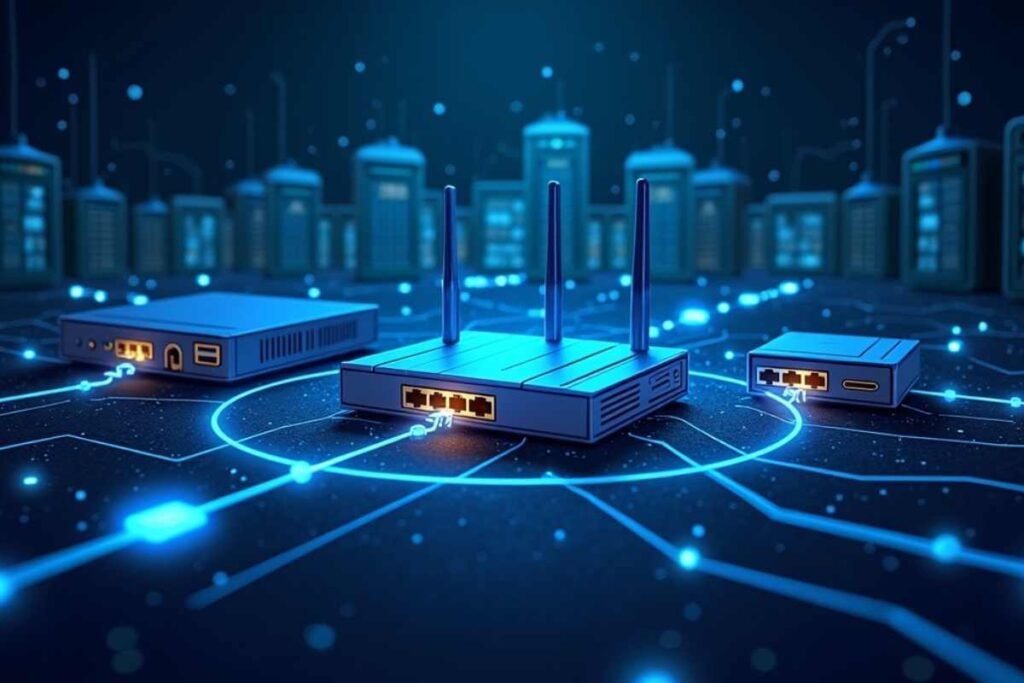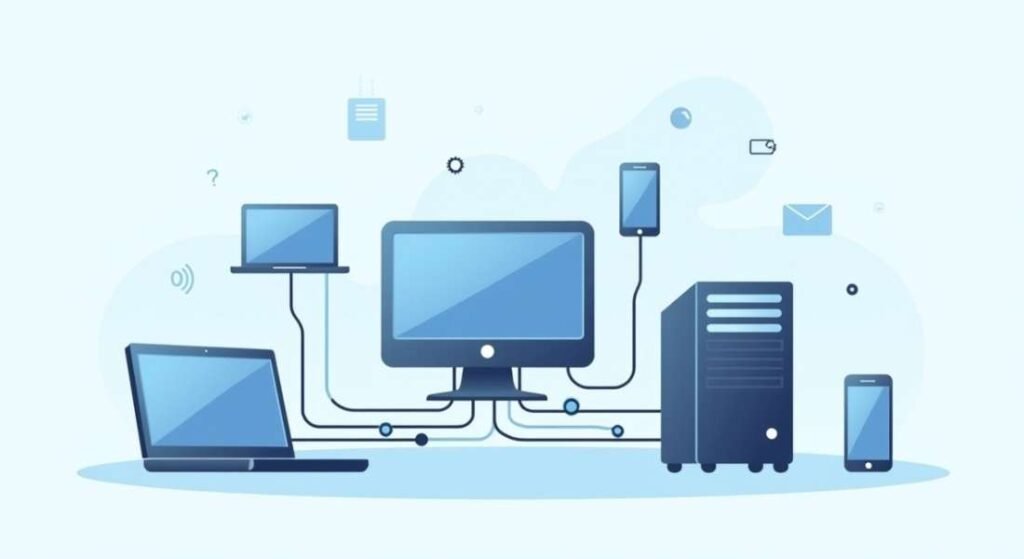If youre preparing for an IT or networking job you’ll surely encounter Computer Networks Interview Questions. Understanding these questions not only helps you ace interviews but also deepens your knowledge of how data moves through systems routers and switches. The field of computer networking forms the backbone of todays digital communication making it essential for both beginners and professionals to master the concepts behind it.
Whether you’re applying for a role as a Network Engineer System Administrator or IT Technician this comprehensive guide will give you a strong foundation to impress interviewers confidently.
What Are Computer Networks?

A computer network is a system that connects multiple computing devices allowing them to share data resources and applications efficiently. These devices communicate through wired or wireless media using predefined rules called protocols. In essence a computer network enables seamless communication between devices like computers servers routers and switches across various geographical locations.
The Computer Networks Interview Questions often begin with the basics such as defining a network explaining its components and describing how data transmission occurs. By understanding the fundamentals you can easily answer advanced networking questions that deal with protocols models and configurations.
Importance of Learning Computer Networks
Learning computer networks is crucial for anyone pursuing a career in IT cybersecurity or software engineering. Networking knowledge helps professionals understand how systems communicate and ensures secure and efficient data transmission. For job seekers being able to answer Computer Networks Interview Questions effectively can be a major differentiator.
Recruiters value candidates who can demonstrate a clear understanding of protocols like TCP/IP OSI layers IP addressing and subnetting. Beyond interviews networking skills are vital for maintaining server health managing network performance and troubleshooting connection problems in real time environments.
Basic Concepts in Computer Networks
Before tackling Computer Networks Interview Questions its essential to grasp the fundamental concepts. These include.
- Nodes and Links: Devices nodes connected via physical or wireless links.
- Protocols: Set of rules defining data communication.
- Bandwidth and Latency: Performance measures that impact network speed and efficiency.
- Network Topologies: The arrangement of nodes like star mesh bus and ring.
- IP Addressing: Unique identifiers for devices on the network.
Having a clear understanding of these basics will help you confidently discuss the architecture and functionality of modern networks during an interview.
Emerging Trends in Computer Networking
As technology evolves so do the trends in networking. Software defined networking SDN network automation and cloud based networking are transforming how systems communicate. Interviewers may ask Computer Networks Interview Questions about these modern technologies to assess your awareness of industry innovations.
For example SDN centralizes network control while network automation reduces manual configuration. Staying updated with Intelligence Trends these trends positions you as a forward thinking candidate.
OSI Model and Its Layers
The OSI Open Systems Interconnection model is a conceptual framework that describes how communication occurs between two systems over a network. This model is divided into seven layers each serving a specific function:
- Physical Layer
- Data Link Layer
- Network Layer
- Transport Layer
- Session Layer
- Presentation Layer
- Application Layer
Interviewers often ask candidates to explain each layer’s function and the protocols that operate within it. For instance the Network Layer is responsible for routing data while the Transport Layer ensures reliable delivery. Understanding the OSI model thoroughly is one of the most frequent Computer Networks Interview Questions asked by recruiters.
TCP/IP Model Overview
The TCP/IP model is a simplified version of the OSI model comprising four layers Network Interface Internet Transport and Application. It defines how data should be packetized addressed transmitted and received.
Many Computer Networks Interview Questions compare OSI and TCP/IP models. The key difference lies in their structure while the OSI model is theoretical TCP/IP is practical and used in real world networking. Understanding this comparison helps candidates showcase both theoretical and practical networking knowledge.
Types of Computer Networks?
One of the most commonly asked Computer Networks Interview Questions is about network types. Here are the primary ones:
- LAN (Local Area Network): Connects devices within a limited area, such as offices or homes.
- WAN (Wide Area Network): Spans large geographical areas, connecting multiple LANs.
- MAN (Metropolitan Area Network): Covers a city or large campus.
- PAN (Personal Area Network): Connects personal devices like smartphones and laptops.
Knowing the use cases advantages and limitations of each type is essential for performing well in networking interviews.
Network Devices and Their Roles

When discussing Computer Networks Interview Questions candidates should be prepared to explain different network devices and their purposes:
- Router: Directs data packets between networks.
- Switch: Connects devices within a LAN and forwards data to the correct destination.
- Hub: A basic device that transmits data to all connected devices.
- Bridge: Connects multiple LANs.
- Gateway: Acts as a link between different network architectures or protocols.
An interviewer may also ask how these devices differ and when each should be used so understanding their functions is vital.
IP Addressing and Subnetting
IP addressing forms the foundation of communication in networks. Every device in a network is assigned a unique IP address for identification and data exchange. There are two types of IP addresses IPv4 (e.g., 192.168.1.1) and IPv6 (e.g., 2001:0db8::1).
Subnetting divides a network into smaller segments for better performance and security. A common Computer Networks Interview Question might involve calculating subnet masks or explaining the benefits of subnetting. Mastering subnetting shows an interviewer your ability to optimize and manage complex networks effectively
Network Security and Encryption
With the rise of cyber threats network security has become a major focus area in interviews. Candidates are often asked how to secure data transmission and prevent unauthorized access.
Encryption converts data into unreadable formats ensuring only authorized users can decode it. Firewalls VPNs and intrusion detection systems are also crucial for securing networks. Answering Computer Networks Interview Questions on security confidently demonstrates your awareness of modern network protection methods.
Troubleshooting Computer Networks
Interviewers love to test how candidates handle real-world network problems. Troubleshooting involves identifying and resolving issues like packet loss, latency, or IP conflicts.
A typical Computer Networks Interview Question might be how do you troubleshoot a slow network? Your answer should include checking hardware connections, verifying IP configurations analyzing network logs and using tools like ping or traceroute. Demonstrating a structured troubleshooting approach highlights your practical expertise.
Wireless Networks and Their Challenges
Wireless networking has become an integral part of modern IT infrastructure. Candidates should understand concepts like Wi-Fi standards IEEE 802.11 access points and encryption methods WPA2 WPA3.
Common Computer Networks Interview Questions include explaining how wireless networks differ from wired ones or how to secure a Wi Fi network. The challenges include signal interference limited bandwidth and security vulnerabilities all of which must be managed effectively by network administrators.
Best Practices for Acing Computer Networks Interviews
To succeed in a computer networking interview candidates should focus on both theoretical and practical preparation. Here’s how you can excel:
- Understand every concept thoroughly.
- Practice configuration tasks on routers and switches.
- Revise real world Computer Networks Interview Questions with scenario based problems.
- Keep up with new technologies like 5G SDN and IoT.
Employers appreciate candidates who can not only answer technical questions but also demonstrate hands-on experience with tutorials-and-guides network setup and troubleshooting.
Additional Insight: Network Protocols Explained!
Protocols are essential for ensuring smooth communication between networked devices. Common ones include HTTP FTP SMTP and SNMP. When answering Computer Networks Interview Questions about protocols emphasize their roles and layers.
For instance HTTP operates at the Application Layer while IP functions at the Network Layer. Understanding these distinctions allows you to confidently discuss network communication standards.
Practical Scenario Based Networking Questions

Some interviewers present candidates with scenario-based Computer Networks Interview Questions to evaluate problem-solving skills. For example:
Scenario: Two computers on the same LAN cannot communicate. What steps would you take?
Answer: Check IP configurations, ensure both devices are on the same subnet verify switch ports, and use ping or ipconfig commands to identify the issue. This structured response demonstrates both technical knowledge and analytical thinking.
Conclusion
Preparing for Computer Networks Interview Questions requires a balance of theory practice and problem solving skills. Understanding models like OSI and TCP/IP mastering IP addressing and knowing how to troubleshoot real world issues will give you a competitive edge.
As networking continues to evolve with technologies like cloud computing and IoT staying updated will enhance your career prospects. Use this guide as your ultimate preparation resource to face interviews confidently and stand out as a skilled network professional.
FAQs
What are the top topics to prepare for computer networks interviews?
You should focus on OSI/TCP IP models IP addressing subnetting routing and switching. Security concepts and troubleshooting skills are also vital.
How can I improve my answers to Computer Networks Interview Questions?
Practice real world examples and use structured explanations. Focus on clarity and logic rather than memorization.
What tools are commonly used for network troubleshooting?
Popular tools include ping traceroute ipconfig Wireshark and network analyzers for identifying performance or connectivity issues.
Why are computer networks important in today’s world?
They enable efficient communication data sharing and resource management across all digital infrastructures forming the core of the internet.
What is the difference between static and dynamic IP addressing?
Static IPs remain fixed and are manually assigned while dynamic IPs change and are managed automatically by DHCP servers.


